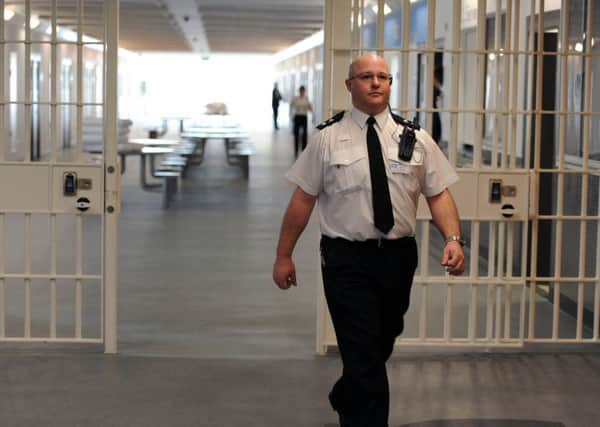Dani Garavelli: Cameron must ignore prison reform backlash


Men serving long sentences were taught how to be better fathers through baby massage classes and under-fives play sessions. They were allowed special “children’s” visits so they could interact freely with younger kids and – unlike in other countries – such visits were not linked to good behaviour. Except where domestic violence has been an issue, regular contact is regarded as being in the best interests of every child; statistics also show it is linked to a reduction in recidivism and can help break the cycle of offending.
During my visit, I was also taken to see other parts of the jail, which was purpose-built and is focused on rehabilitation. I saw the education wing where the men had been involved in a project on the First World War, and I saw the laundry, workshops and bakery. Much effort is expended on getting prisoners job-ready and those nearing the end of their sentences are sent out on work placements. Of course, I didn’t get to wander freely so I don’t know what was going on in the accommodation blocks, but the main building felt more like a school than a jail and the prison officers certainly seemed committed to helping their charges reintegrate into society.
Advertisement
Hide AdAdvertisement
Hide AdIf only all prisons were like that. But things do seem to be getting better. Last week brought news that Cornton Vale – with its terrible suicide record – is to close in the summer. It will eventually be replaced by a smaller national prison and a network of units where children will be allowed to sleep over with their mothers. When you think that a year ago the Scottish Government seemed hell-bent on building a £75m super-prison in Inverclyde, this represents real progress.
Just as significantly, we are now having a debate about sentencing. A campaign to scrap terms of under 12 months in favour of community-based alternatives is gaining momentum, with HM Chief Inspector of Prisons, penal reform charities and several local councils in favour. The rise in the number of people being incarcerated, which saw the prison population grow by a third since 2000, has stalled, and the number of young offenders behind bars is in sharp decline. We are still among the most prolific jailers in Europe, but we appear to agree it’s important to reverse the trend and that overcrowded jails and very short sentences militate against effective rehabilitation.
More astonishing than the changes in Scotland is the Conservative Party’s sudden volte face over prison reform in England and Wales. For years, the two main parties have parroted the same old “tough on crime” mantra, apparently oblivious to the fact their crumbling Victorian prisons and punitive regimes were fuelling reoffending.
As Justice Secretary, Chris Grayling tried to stop prisoners receiving books, thus exposing himself as a dullard who failed to grasp the links between books and literacy, literacy and employability and employability and a becoming a productive member of society.
Now the government has changed its tune. Since Michael Gove replaced Grayling, he has been laying the ground for reform. And it appears David Cameron is right behind him.
Talking to the Policy Exchange, the Prime Minister outlined initiatives so radical you wondered if an undercover agent from the Howard League had snuck in and sabotaged his speech. He spoke of using technology to allow female prisoners to stay in the community so their babies don’t end up behind bars, of prisoners spending a few days a week in jail, of setting up six pilot prisons where governors would be given greater autonomy and of allowing prisoners not to declare their convictions on job applications (although clearly they would have to do so at some point).
All this, Cameron says, is an effort to address the Prison Service’s failure to make an impact on recidivism. The reforms are also aimed at tackling high levels of violence, drug-taking and self-harm. If you want to assess how far they depart from the usual Tory narrative you only have to look at the reaction of backbencher Philip Davies, who immediately branded them “hare-brained”. Although, to be fair, when it comes to uttering moronic statements Davies could give John Mason a run for his money.
Cynics have suggested that – as in the US – the motive behind prison reform is to save cash, given it costs £65,000 to jail someone and a further £40,000 a year to keep them there. As in Scotland, the initiatives will only be meaningful if they’re combined with an overhaul of sentencing policy which could be challenging. Last week, for example, the Sentencing Council suggested offenders who pleaded guilty on their first appearance could have their sentences cut by a third, a plan which could be presented as a reward scheme by anyone wishing to undermine it.
Advertisement
Hide AdAdvertisement
Hide AdThe test will be how much Cameron is prepared to invest in the kind of intensive programmes that help turn damaged lives around and whether he stands firm when the rhetoric around law and order becomes more heated.
A few caveats aside, it feels as if we are reaching a turning point in attitudes towards incarceration in Britain. Those of us who believe a reduction in the prison population and effective rehabilitation are the way forward need to seize the moment and ensure the Prime Minister’s unexpected conversion doesn’t melt away at the first hint of a backlash. «